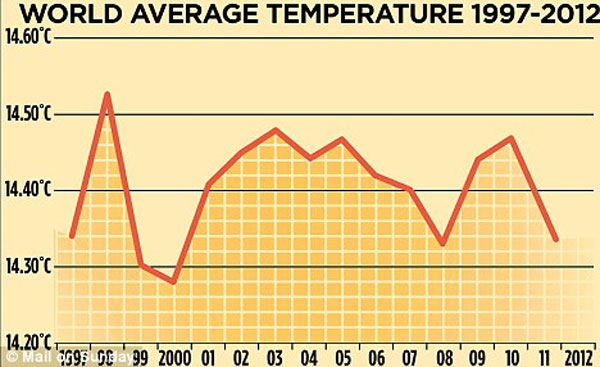Many environmentalists may say the issue of global warming and the role of human-based carbon emissions in causing is "settled," but some new data seems to tell an opposite tail.
Based on readings from more than 30,000 measuring stations, data released rather quietly two weeks ago by the Met Office and the University of East Anglia Climatic Research Unit (of Climategate email fame) shows that the rising trend in world temperatures ended stalled since 1997.
At the same time, a number of leading climate scientists are saying that, after emitting unusually high levels of energy throughout the 20th Century, the sun is now heading towards a "grand minimum" in its output, which could bring on a "mini-ice age" before long.
"World temperatures may end up a lot cooler than now for 50 years or more," Henrik Svensmark, director of the Center for Sun-Climate Research at Denmark’s National Space Institute, told London's Daily Mail.
However, Rob Painting of Skeptical Science wrote in a blog post that "The hiatus in global surface temperatures appears to simply be a reflection of natural variability, principally the exchange of heat between the ocean surface and the atmosphere. But we shouldn’t expect this to last much longer. Eventually that ocean heat buried in deeper layers will come back to the surface, and we’ll experience the warm phase of this natural cool/warm cycle."
And to add more fuel to the debate, the next major ice age could be delayed by thousands of years due to excessive amounts of heat-trapping carbon dioxide in the atmosphere, which disrupts Earth’s natural cycle of warming and cooling, according to a study in Nature Geoscience.
So would that make global warming a good thing or a bad thing? Most of us will need to ask future generations, or await a time traveler.
The Met Office, the UK's national weather service, took exception to some of conclusions coming as a result of the 15-year temperature data, commenting specifically on one article in the Daily Mail.
It wrote that "Several decades of data will be needed to assess the robustness of the projections. However, what is absolutely clear is that we have continued to see a trend of warming, with the decade of 2000-2009 being clearly the warmest in the instrumental record going back to 1850. Depending on which temperature records you use, 2010 was the warmest year on record."
At issue in a sense that since 1997, temperatures dipped for a bit before starting to rise again, fell a bit, that rose once more in recent years, so that in the end there was little change over the full period through 2011. (See graphic below.) However, the Met Office says the longer term pattern over the last 50 years shows a more consistent warming trend than the last decade and a half.

Source: The Daily Mail
The Met Office also challenged the predictions by some that a decline in solar activity, causing global cooling, will overwhelm any impacts of greenhouse gases in the atmosphere that would promote warming.
It says a recent study it conducted "confirmed that although solar output is likely to reduce over the next 90 years, this will not substantially delay expected increases in global temperatures caused by greenhouse gases. The study found that the expected decrease in solar activity would only most likely cause a reduction in global temperatures of 0.08 degrees C. This compares to an expected warming of about 2.5 degrees."
However, Svensmark retorted that "It will take a long battle to convince some climate scientists that the sun is important. It may well be that the sun is going to demonstrate this on its own, without the need for their help."
Svensmark and others note that solar activity was very active in the 20th century - the period of general warming cited by many climatologists as evidence of the impact of man-made greenhouse gases.
"Nature is about to carry out a very interesting experiment," said Pal Brekke, senior adviser at the Norwegian Space Center. "10 or 15 years from now, we will be able to determine much better whether the warming of the late 20th Century really was caused by man-made CO2, or by natural variability."
Have a comment on this article? Send it to us at the Feedback button below.

TheGreenSupplyChain.com is now Twittering! Follow us at www.twitter.com/greenscm |